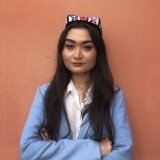This is
Zumretay Arkin receives the Freedom of Worship Award.
Zumretay Arkin has been campaigning for years for the rights of Uyghurs, a people in western China. Arkin draws international attention to the suppression of religious freedom and violation of the Uyghur people’s human rights. She has founded a Uyghur friendship group for women worldwide and is working tirelessly to support Uyghur refugees. She is also a spokesperson for the World Uyghur Congress. She advocates for the protection and preservation of Uyghur culture, religion and language in international forums, including the United Nations. Arkin gives a voice to the voiceless.
More about Zumretay Arkin
Zumretay Arkin is Uyghur herself: she grew up in Ürümqi, the capital of Xinjiang. She now advocates the rights of her people from Munich, Germany. Following the Qing Dynasty's colonial expansion, in 1884 the area where the Uyghurs lived officially became a province of China and was renamed Xinjiang, which translates to 'new frontier.' When the People's Republic of China was founded in 1949 Xinjiang was annexed to the People’s Republic. At the time, Xinjiang's local population were predominantly Turkic peoples like the Uyghurs, with Han Chinese comprising 5%. Over the following decades, Han Chinese migration to the region led to social inequality and unrest.
Since 1990, there have been several confrontations between the local population and the government who was imposing religious restrictions. This resulted in excessive government violence in the 1990s, leading to hundreds of Uyghur deaths. Since 2017, systematic oppression has occurred under the guise of 'de-radicalization', further threatening Uyghurs' religious freedom. This is manifesting itself in mass detention, torture, cultural and religious persecution, forced labor, and sexual violence. Human Rights Watch estimates that over half a million Muslims are being detained in re-education camps, with other estimates reaching into the millions. Zumretay Arkin is fighting for the freedoms of these people.

